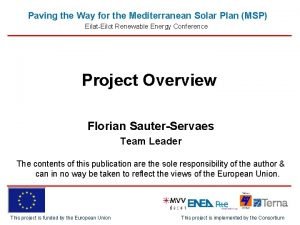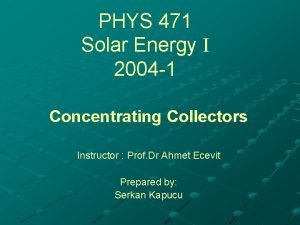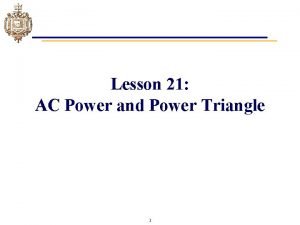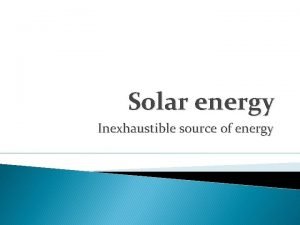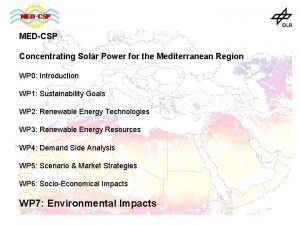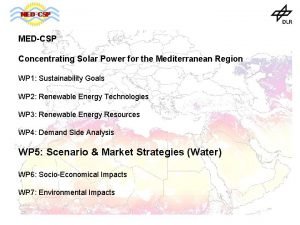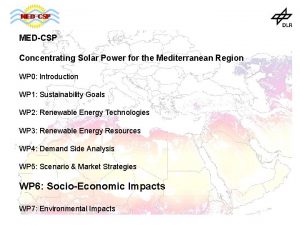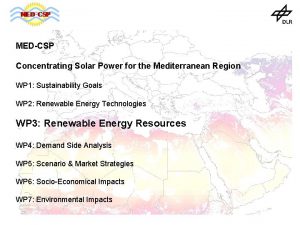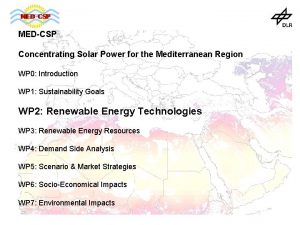MEDCSP Concentrating Solar Power for the Mediterranean Region






- Slides: 6

MED-CSP Concentrating Solar Power for the Mediterranean Region WP 0: Introduction WP 1: Sustainability Goals WP 2: Renewable Energy Technologies WP 3: Renewable Energy Resources WP 4: Demand Side Analysis WP 5: Scenario & Market Strategies WP 6: Socio-Economical Impacts WP 7: Environmental Impacts

Guidelines for a sustainable energy supply Equality of access: Equal opportunities in accessing energy resources and energy services shall be assured for all. Protection of resources: The different energy resources shall be maintained for the generations to follow, or there shall be comparable options created to provide sufficient energy services for future generations. Environmental compatibility: The adaptability and the ability for regeneration of natural systems (the “environment”) may not be exceeded by energyrelated emissions and waste. Risks for human health – by e. g. an accumulation of problematical pollutants and harmful substances – shall be avoided. Social compatibility: It shall be assured when realising the energy supply systems that all people affected by the system are able to participate in the decision-making processes. The ability of economic players and communities to act and shape may not be restricted by the systems being set up, but rather shall be expanded wherever possible. Error tolerance and low risk: Unavoidable risks and hazards arising from the generation and use of energy shall be minimised and limited in their propagation in space and time. Human errors, improper handling, wilful damage, and incorrect use shall also be taken into consideration in the assessment. Economic efficiency: Energy services shall – in relation to other costs in the economy and of consumption – be made available at acceptable costs. The criterion of “acceptability” refers, on the one hand, to specific costs arising in conjunction with the generation and use of the energy and, on the other hand, to the overall economic costs while taking the external ecological and social costs into consideration as well. Security of supply: The energy required to satisfy the human needs must be available according to the demand in sufficient quantities, in terms of both time and location. The energy supply must be adequately diversified so as to be able to react to crises and to have sufficient margins for the future and room to expand as required. Efficient and flexible supply systems harmonising efficiently with existing population structures shall be created and maintained. International co-operation: Developing the energy systems shall reduce or eliminate potential conflicts between states due to a shortage of resources and also promote the peaceful co-existence of states by a joint use of capabilities and potentials.

Work Package 1: CO 2 -Emissions – State and Targets CO 2 Emissions calculated according to GHG targets

World wide obligation in 2050 (proposed by WBGU, 2003)

Weighing Technology Options for Sustainability 0 + + + Offshore Wind Power + + + + + Geothermal Hot Dry Rock + + + + 0 Biomass + + +/0 + + + Hydropower w. Storage + + -/0 0 0 0 + + Wave / Tidal Power + + + 0 Solar Thermal Electricity + + + + + Photovoltaic + + + 0 0 + + Nuclear Fission - 0 - - - 0 + Nuclear Fusion 0 + 0 0 +/0 0 - Fossil Plant Efficiency 0 + + 0 0 + + Energy Use Efficiency + + + + + Long Distance Transmission + 0 0 0 + + + CO 2 -Sequestration 0 - 0 0 0 In te y sib ilit l. F ea ni ca Te ch rn at io na l. C oo pe r at Su p of y rit Se cu ic m on o Ec io pl y y Ef fi Lo w ol er an ce an d l. C om r. T cie nc y ilit pa tib ib Er ro en nm iro pa t ta l. C om Re so of n So cia ce ss of ity ua l io En v - negative effect Pr ot ec t 0 uncertain effect Eq + positive effect ac Effect on Energy Sustainability: n + Ri sk + ilit y + ur ce s Onshore Wind Power

SEND YOUR OPINION ! Name: . . Onshore Wind Power Offshore Wind Power Geothermal Hot Dry Rock Biomass Hydropower Wave / Tidal Power Solar Thermal Electricity Photovoltaic Nuclear Fission Nuclear Fusion Fossil Plant Efficiency Energy Use Efficiency Long Distance Transmission te y n sib ilit io ni ca l. F ea pe r Te ch rn at io na l. C oo of y rit Se cu ic m on o Ec at Su p cie nc pl y y Ri sk Ef fi In r. T ol er an ce an d l. C om Lo w pa tib ilit y ib Er ro en nm iro En v pa t ta l. C om Re so of n io So cia ce ss of ua l ity Pr ot ec t - negative effect Eq 0 uncertain effect ac Effect on Energy Sustainability: + positive effect ur ce s CO 2 -Sequestration
